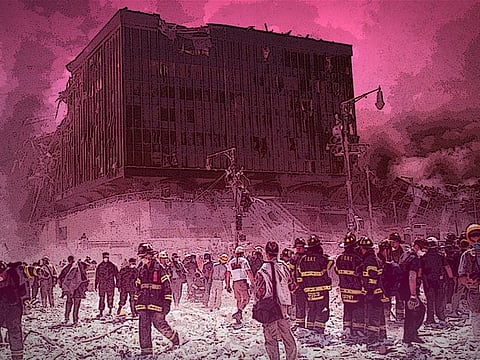20th anniversary of 9/11: A political crime that changed the world
The magnitude of it all left a lasting historical legacy that would not be easily erased

It would’ve been futile to have tried measuring the degree of shock, grief and outrage that gripped Americans on Sep. 11, 2001, after two terrorist-hijacked planes, full of passengers, plowed into the Twin Towers of the World Trade Center in New York and one into the Pentagon in Washington, while a fourth crashed into a field in Pennsylvania.
It would’ve been as futile an endeavour as that of a mad mathematician trying to take Pi to its final decimal point. As futile as trying to explain why 2,977 innocent people had to die on that clear, sunny morning exactly twenty years ago this coming Saturday.
So keenly felt was its horror, so immense was its toll, and so slow was its impact in dissipating that the event continues, two decades after the fact, to gnaw away at Americans’ collective memory, like a raw wound. Very simply, the magnitude of it all left a lasting historical legacy that would not be easily erased.
The 9/11 attacks — unprecedented in the annals of terrorism and the deadliest committed by any foreign entity on US soil — were clearly intended by the perpetrators as a political crime. We often draw a moral distinction between political crimes carried out against tyranny and those driven by pure hatred. And the group that launched those attacks may have been imbued with the latter
sentiment but they were also witless enough to assume that they could partake in the excitement of evil without bearing the real cost.
There was no question in anyone’s mind that America, America the big power, America the leader of the free world, would respond in time, meting out terrible punishment to fit the terrible crime. And America did indeed respond — with blood and fire, launching what became officially known as the Global War on Terror, the longest sustained military campaign in US history, one that took it to the faraway lands of Afghanistan and then Iraq.
The campaign opened when then President George W. Bush addressed a sombre Congress on September 20, 2001. “Our war on terror begins in Afghanistan, but does not end there”, he told its members. “It will not conclude until every terrorist group of global reach has been found, stopped and defeated”. And it closed two decades later when incumbent President Joe R. Biden addressed the nation in a speech on Tuesday last week, almost exactly twenty years on, declaring the termination of “an era of major military operations [by the US] to remake other countries.
The two speeches were fitting bookends to two tumultuous decades that began with the 9/11 terrorist attacks and ended on Aug. 31 with the chaotic finale of the war in Afghanistan and the largest air evacuation in US history.
The Global War on Terror panned out as a conflict that caused incalculable grief everywhere, one that, in its ripple effects, changed not just America but the world as a whole in heartbreaking ways.
You ask, heartbreaking? And how so?
Well, consider the annual report released by the prestigious The Costs of War Project (CWP) at the Watson Institute for International and Public Affairs at Brown University ahead of the 20th anniversary of the 9/11 attacks.
The report estimates that the cost of the Global War on Terror reached a staggering $8 trillion in 80 countries. You want to ignore the dollars and cents? Fine, consider then the cost exacted in human suffering.
The death toll from that war over the last two decades stands at between 800,000 and 900,000, a figure that, researchers of the report note, includes everybody touched by it — American military servicemembers, allied and opposition fighters, civilians, journalists and humanitarian aid workers, killed as a direct result of war, as well as the many indirect deaths caused as a result of disease, displacement and loss of access to food or clean drinking water.
And the CWP report is only the half of it.
As this long, elusive war was being waged, you see, there occurred a shift, a puncture in the dialectic, if you wish, in America’s highest values and ideals. which then gave way, sadly, to a lust for vengeance, which in turn gave way to Abu Ghraib and Dark Sites, where America’s claims to moral authority were mocked abroad. And at home, the US Patriot Act cast a long shadow on American life as civil liberties were subverted, with religious and immigrant minorities targeted for harassment, and worse.
So, come to think of it, no, the magnitude of the 9/11 attacks did not leave a lasting legacy on the historical memory of America alone. The legacy belongs to all of us who inhabit what today has become our little, contracted global village where we all live and are in turn affected by each others’ actions.
And, no, when one reiterates the claim that Sep. 11, 2001 was a day that changed the world — a claim repeated to the point of litany, rendering it a cliché — one is not resorting to hyperbole, for those close to a million folks who perished abroad were as much victims of 9/11 as the close to three thousand souls who perished on American soil. We thus mournfully commemorate the memory of that fateful day — at once lasting, bewildering and harrowing in global history — all together.
— Fawaz Turki is a journalist, academic and author based in Washington. He is the author of The Disinherited: Journal of a Palestinian Exile
Sign up for the Daily Briefing
Get the latest news and updates straight to your inbox









